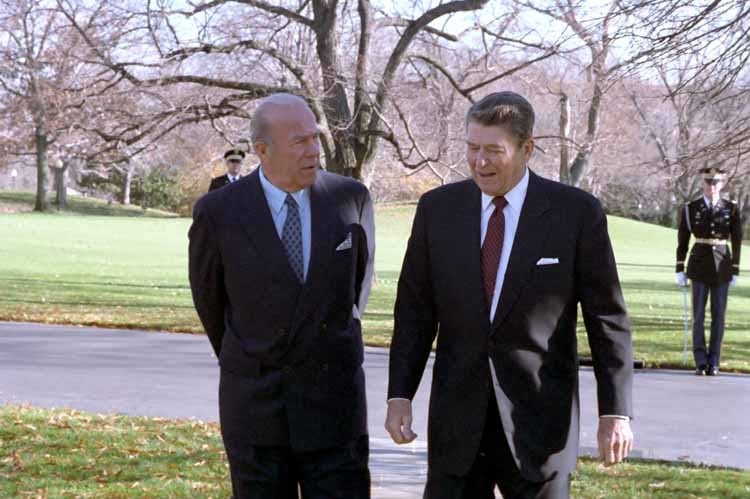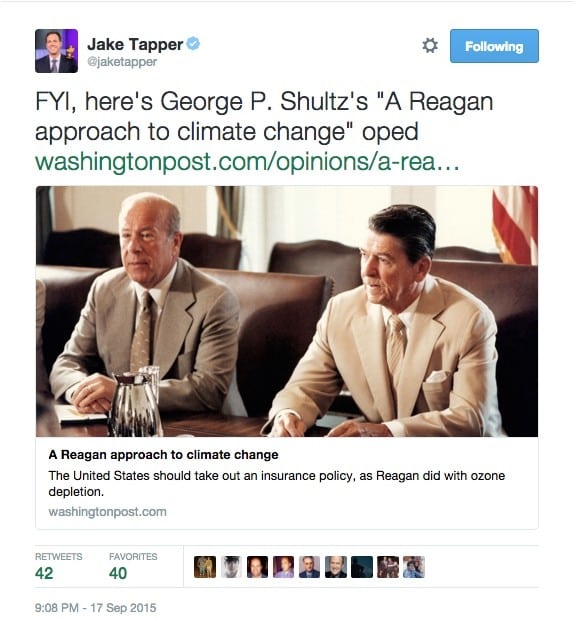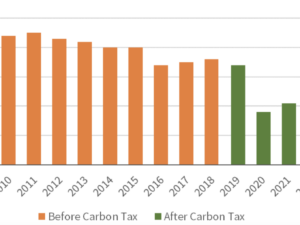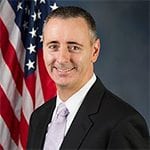By Steve Valk
He wasn’t in the room, but former Secretary of State George Shultz had a big impact during the Republican presidential debate last month when CCN’s Jake Tapper posed this question:
“Shultz reminds us that when Ronald Reagan was president, he faced a similar situation to the one we’re facing now. There were dire warnings from the mass consensus of the scientific community about the ozone layer shrinking. Shultz says Ronald Reagan urged skeptics in industry to come up with a plan. He said do it as an insurance policy in case the scientists are right. The scientists were right. Reagan and his approach worked. Sec. Shultz asks why not take out an insurance policy and approach climate change the Reagan way?”
It was obvious from the answers that the candidates had little or no idea what Shultz was proposing in the way of a policy – a revenue-neutral carbon fee. Sen. Marco Rubio said, “We’re not going to destroy our economy the way the left-wing government that we are under now wants to do.”
New Jersey Gov. Chris Christie chimed in: “We shouldn’t be destroying our economy in order to chase some wild left-wing idea that somehow us by ourselves is going to fix the climate. We can contribute to that and be economically sound.”
Regular readers of our blog of course know that the Shultz plan, which is the same as CCL’s proposal, would not “destroy the economy.” In fact, according to a study from Regional Economic Models, Inc., a carbon fee that is fully rebated to households will actually add 2.8 million jobs over a 20-year period.
Tapper tried to enlighten the candidates and their followers the next day with this tweet referencing Shultz’ op-ed in the Washington Post:
The climate change exchange at the debate lasted only a few minutes, but the “Shultz plan” is starting to reverberate in the media. And things that reverberate in the media have a way attracting attention in congressional offices.
Two weeks after the debate, Jeb Bush released his energy plan, which would dismantle Obama’s Clean Power Plan, the only policy in play right now to reduce greenhouse gas emissions. A Washington Post editorial called Bush’s plan “breathtakingly irresponsible,” and cited Shultz with this admonishment:
“A true conservative would heed expert warnings against altering the atmosphere’s chemistry, head off the risk of dangerous climate change early, and do so using market-based policies that keep as much control in the hands of consumers and companies as possible. A true conservative would do what Reagan secretary of state George Shultz advocates: Put a simple fee on carbon dioxide emissions and allow the market to adjust. So far, there doesn’t seem to be a true conservative in the GOP field.”
Bush may be getting the message. Responding to a question about climate change at a town hall meeting in New Hampshire this week, he said, “The first thing that I think we have to do is to adapt, to create policies of adaptation, to recognize that if the climate is to change, we have to have an insurance policy.”
While Bush didn’t mention putting a price on carbon, his use of the phrase “insurance policy” is an indication that Shultz’ views are taking hold and that the former Florida governor could be moving in the direction of a market-based solution.
Here’s a clip from New Hampshire:
The Post is not the only major media outlet running with the Shultz meme. New York Times columnist Tom Friedman also referenced him in a recent piece:
“When, at CNN’s G.O.P. presidential debate, the moderator Jake Tapper read statements from Ronald Reagan’s secretary of state George Shultz (who drives an electric car powered by solar panels on his home’s roof) about how Reagan urged industry to proactively address ozone depletion, and why Shultz believes we should be just as proactive today in dealing with climate change, he got the usual know-nothing responses.”
Commenting on Christie’s flip remark about Shultz – “Listen, everybody makes a mistake every once in a while.” – Friedman wrote:
“They sure do, and it’s not Shultz, who has been wisely and courageously telling Republicans that the conservative thing to do now is to take out some insurance against climate change, because if it really gets rocking the results could be ‘catastrophic.’ Hurricane Sandy — likely amplified by warmer ocean waters — caused over $36 billion in damage to Christie’s own state, New Jersey, in 2012.”
Shultz is an iconic figure, not just in mainstream Republican circles but also across a broad spectrum of the American public. His views on climate change and his proposal to deal with it through a market-based approach are starting to resonate with the media and policy-makers.
As CCL volunteers continue their stellar work of getting published in newspapers throughout the country, references to the “Shultz insurance policy” will increase pressure on Republican members of Congress to look more closely at the Carbon Fee and Dividend solution.
Eventually many of them will reach the same conclusion that Shultz did: “Follow Reagan’s example and take out an insurance policy.”
Steve Valk is communications director for Citizens’ Climate Lobby.







